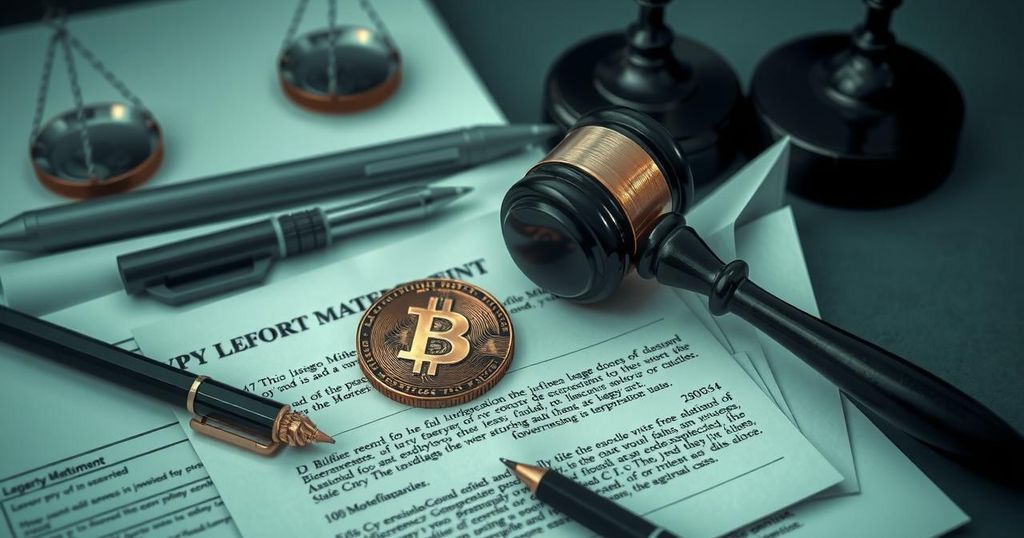Alex Mashinsky Sentenced to 12 Years in Prison for Multi-Billion-Dollar Crypto Fraud
Alex Mashinsky, ex-CEO of Celsius Network, sentenced to 12 years for fraud. His guilty plea follows extensive legal troubles and a $4.7 billion FTC settlement amidst accusations of misleading investors. The case aligns with the broader collapse within the crypto industry, as many executives face similar repercussions.
Alex Mashinsky, the former CEO of Celsius Network, was handed a hefty 12-year prison sentence on Thursday after admitting guilt to two fraud counts. His case marks a significant decline for a man once viewed as a pioneer in the crypto scene. In front of U.S. District Judge John G. Koeltl, and in a well-worn Manhattan courtroom, Mashinsky now confronts the aftermath of a widespread fraud scandal.
In December, Mashinsky pleaded guilty to charges of commodities fraud and manipulating Celsius’s token. This sentencing was just one of many high-profile cases in recent months, as the crypto industry grapples with its reputation. Mashinsky’s legal issues started back in 2023 when he was arrested, coinciding with Celsius’s monumental $4.7 billion settlement with the Federal Trade Commission — a historic sum that highlighted the depth of the scandal.
Prosecutors accused him of misleading investors about the Celsius platform’s stability and profit potential while secretly selling off millions of dollars in personal crypto assets. Though Mashinsky initially denied any wrongdoing, his guilty plea and subsequent sentencing close a dark chapter that also saw charges from both the SEC and the Commodity Futures Trading Commission.
The downfall of Mashinsky is eerily similar to that of other fallen crypto leaders like FTX’s Sam Bankman-Fried, Changpeng Zhao of Binance, and Do Kwon of Terraform Labs. Bankman-Fried was sentenced to 25 years back in March 2024 for his own tangled web of fraud and conspiracy that decimated not only his crypto exchange but also the hedge fund he operated. Once a shimmering star in cryptocurrencies, he was found to have mishandled billions in customer funds while living lavishly.
In the same vein, his associate Caroline Ellison received a much lighter sentence of only two years. Thanks to her cooperation with the authorities, she helped untangle the fraud that led to Bankman-Fried’s conviction. Meanwhile, other figures from the FTX drama have faced varying degrees of accountability, some avoiding jail altogether as they struck deals with prosecutors.
On another note, in late 2023, Binance founder Zhao settled a prolonged investigation with the U.S. government, despite stepping down as CEO one year prior. In April 2024, he received a four-month prison sentence for his role in money laundering activities, serving that time in a low-security facility in California.
Also, Terraform Labs founder Do Kwon, infamous for his failed stablecoin project, saw a dramatic rise and fall similar to that of his peers. His eponymous venture garnered significant attention when it was worth billions — that is, until it all collapsed in May 2022, erasing $40 billion in market value and triggering a cascade of failures across the crypto space.
Currently, Kwon faces his own legal battles after being extradited to the U.S. from Montenegro on fraud charges. His judicial troubles emerged following significant losses suffered by major crypto players, including the collapse of hedge funds and lenders, all stemming from the unraveling of his ambitious, yet flawed projects. Meanwhile, former colleagues of Kwon and others are still navigating their own paths, some managing to evade the legal consequences that often catch up with people in their positions.
The downfall of prominent crypto executives has cast a long shadow over the industry, revealing alarming levels of misconduct and fraud. Alex Mashinsky’s case embodies the larger narrative of ruin in the crypto world, with each leader’s fall echoing the lessons yet to be learned. As ongoing investigations and legal consequences unfold, trust in the crypto sector appears shaken, leaving many to wonder about its future viability.
Original Source: www.cnbc.com




Post Comment